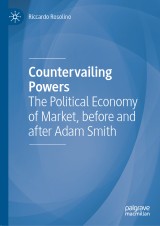Details

Countervailing Powers
The Political Economy of Market, before and after Adam Smith|
106,99 € |
|
| Verlag: | Palgrave Macmillan |
| Format: | |
| Veröffentl.: | 25.02.2020 |
| ISBN/EAN: | 9783030378028 |
| Sprache: | englisch |
Dieses eBook enthält ein Wasserzeichen.
Beschreibungen
<p>This book will trace the trajectory of the surprising idea that the victims of monopolistic conspiracies should be allowed to fight back using the same fraudulent and immoral weapons as the conspirators. In other words, if left to itself, the market will produce the antibodies necessary to survival, notwithstanding its most sinister pathology – the tendency of its principals to conclude private agreements behind the scenes.</p><p>Originally conceived in a moral context halfway through the 16th century, the idea was then taken over by the world of commercial law in exactly the form it had been employed theologically. Surprisingly, though, after doing the rounds for over a century, it then disappeared without trace. This book will look at how Adam Smith revived and recharged the idea. He applied it in <i>The Wealth of Nations </i>(1776) to the conflict of interest between employers and workers in the attempt to break the stranglehold of the artificial compression of wages to minimum subsistence level. After Smith, the freshly revived idea went underground again for another half-century until, in the 1820s, it assumed a front-row position in the newborn liberal political economics. This book will look at how, in the framework of the debate over the repeal of the Combination Laws, the idea was dusted down and put back in the fight, having first been stripped it off its moral clothes and dressed instead in the new robes of economic pragmatism.</p><p></p>
<p>Chapter 1. Introduction.- Chapter 2. Adam Smith, Workers’ Rights and the Political Side of the Market.- Chapter 3. Monopoly versus Monopoly.- Chapter 4. Against the Current.- Chapter 5. Who's Afraid of Giants?.</p>
<b>Riccardo Rosolino</b> is Associate Professor of Modern History at the University of Naples "L'Orientale", Department of Human and Social Science, Italy.
<p>This book will trace the trajectory of the surprising idea that the victims of monopolistic conspiracies should be allowed to fight back using the same fraudulent and immoral weapons as the conspirators. In other words, if left to itself, the market will produce the antibodies necessary to survival, notwithstanding its most sinister pathology – the tendency of its principals to conclude private agreements behind the scenes.</p>
Originally conceived in a moral context halfway through the 16th century, the idea was then taken over by the world of commercial law in exactly the form it had been employed theologically. Surprisingly, though, after doing the rounds for over a century, it then disappeared without trace. This book will look at how Adam Smith revived and recharged the idea. He applied it in <i>The Wealth of Nations </i>(1776) to the conflict of interest between employers and workers in the attempt to break the stranglehold of the artificial compression of wages to minimum subsistence level. After Smith, the freshly revived idea went underground again for another half-century until, in the 1820s, it assumed a front-row position in the newborn liberal political economics. This book will look at how, in the framework of the debate over the repeal of the Combination Laws, the idea was dusted down and put back in the fight, having first been stripped it off its moral clothes and dressed instead in the new robes of economic pragmatism.<p></p>
Originally conceived in a moral context halfway through the 16th century, the idea was then taken over by the world of commercial law in exactly the form it had been employed theologically. Surprisingly, though, after doing the rounds for over a century, it then disappeared without trace. This book will look at how Adam Smith revived and recharged the idea. He applied it in <i>The Wealth of Nations </i>(1776) to the conflict of interest between employers and workers in the attempt to break the stranglehold of the artificial compression of wages to minimum subsistence level. After Smith, the freshly revived idea went underground again for another half-century until, in the 1820s, it assumed a front-row position in the newborn liberal political economics. This book will look at how, in the framework of the debate over the repeal of the Combination Laws, the idea was dusted down and put back in the fight, having first been stripped it off its moral clothes and dressed instead in the new robes of economic pragmatism.<p></p>
Traces the history of the theories applying the principle of fighting fire with fire to market dynamics Illustrates the relevance of recourse to the right of resistance for conceiving the self-sufficiency of the market Focuses on the moral and political solution of letting monopolistic conspiracies neutralise each other
R. Rosolino, interprétant et généralisant la pensée smithienne, tire une conclusion de cette passionnante histoire intellectuelle. À l’idée que le marché ne peut survivre que si les intérêts poursuivis ne le sont que de façon individuelle, il faut ajouter un corollaire : si des intérêts particuliers sont portés par un groupe social cherchant à s’imposer, alors cette ambition ne peut être contrée que par la formation d’un groupe d’intérêts opposés utilisant des méthodes identiques.<br><br> <b>Annales, HSS, 76-1 (2021), Prof. J.-Y. Grenier (École des Hautes Études en Sciences Sociales - Paris School of Economics)</b>


















